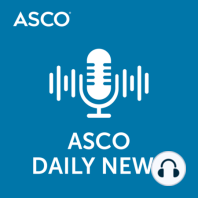44 min listen
Unavailable

Currently unavailable
#ASCO21: Advancing Treatment For Genitourinary Cancers With Dr. Neeraj Agarwal
FromASCO Daily News
Currently unavailable
#ASCO21: Advancing Treatment For Genitourinary Cancers With Dr. Neeraj Agarwal
FromASCO Daily News
ratings:
Length:
24 minutes
Released:
Jun 3, 2021
Format:
Podcast episode
Description
Dr. Neeraj Agarwal, director of the Genitourinary Oncology Program at the University of Utah Huntsman Cancer Institute and incoming editor-in-chief of ASCO Daily News, highlights key abstracts in GU oncology featured at the 2021 ASCO Annual Meeting. Transcript: ASCO Daily News: Welcome to the ASCO Daily News podcast. I'm Geraldine Carroll, a reporter for the ASCO Daily News. My guest today is Dr. Neeraj Agarwal, a medical oncologist and director of the Genitourinary Oncology Program at the University of Utah Huntsman Cancer Institute. He joins me to discuss key abstracts in the GU field featured at the 2021 ASCO Annual Meeting. Dr. Agarwal has served in a consulting or advisory role for AstraZeneca, Bristol Myers Squibb, Exelixis, and Merck, among other organizations. He is a co-author of a study, Abstract 5073, that will be discussed in this episode. Dr. Agarwal's full disclosures and those relating to all episodes of the podcast are available on our transcripts at asco.org/podcasts. Dr. Agarwal, it's great to have you on the podcast again. Dr. Neeraj Agarwal: It's my pleasure, and an honor. Thank you very much for having me. ASCO Daily News: Dr. Agarwal, let's start with some exciting news in the field of kidney cancer. LBA5 addressed the Keynote 564 trial, which evaluated pembrolizumab versus placebo as adjuvant therapy for patients with renal cell carcinoma. This study reported stunning results. What can you tell us about this trial? Dr. Neeraj Agarwal: These are very important results from the Abstract LBA5, which is being presented by Dr. Toni Choueiri, from Dana Farber Cancer Institute, and colleagues on interim results from the KEYNOTE-564 trial, which showed that adjuvant therapy with pembrolizumab after complete resection of intermediate high, high-risk, localized or oligometastatic renal cell carcinoma improves survival outcomes. So, let me give you a background first. Partial and radical nephrectomy is considered standard of care for treatment of men or women with localized renal cell carcinoma. However, approximately half of these patients eventually recur. In addition, many patients with limited metastatic disease undergo surgical resection. Currently, there is no standard of care systemic therapy available for these patients. So, the KEYNOTE-564 study is a phase III trial evaluating pembrolizumab versus placebo--which is a standard of care, by the way, for these patients as adjuvant therapy for patients with clear cell renal cell carcinoma with intermediate high risk, high-risk, or those with metastatic disease who have undergone complete resection of metastatic disease. Primary endpoint was disease-free survival for investigator assessment, in intent-to-treat population. Overall survival was a key secondary endpoint. In this study, a total of 994 patients were randomized, one to one, to pembrolizumab or placebo. At the time of data cutoff, median follow up was 2 years. There were no patients remaining on the study treatment. If you look at the baseline characteristics, they were evenly balanced between the two arms. At the first, prespecified interim analysis, the primary endpoint of disease-free survival was met, though the median values were not reached for both arms. Pembrolizumab was associated with a significantly longer disease-free survival than placebo, with a hazard ratio of 0.68 and a one-sided p-value of 0.001, which translates into 32% reduction in risk of recurrence of disease or death with adjuvant pembrolizumab. The 2- year rate of disease-free survival was 77.3% with pembrolizumab, as compared to 68% of the placebo. Overall, disease-free survival benefit was consistent across subgroups. Median overall survival was not reached for either groups, and the estimated 24 months survival rate was high in both groups at 96% and 93.5% with pembrolizumab and placebo, respectively. And really, there were no new safety signals seen with pembrolizumab. So, I'd like to summarize these
Released:
Jun 3, 2021
Format:
Podcast episode
Titles in the series (100)
Advances in Breast Cancer With Dr. Hope Rugo: Dr. Hope Rugo, professor of medicine and director of Breast Oncology and Clinical Trials Education at the University of California, San Francisco Helen Diller Comprehensive Cancer Center, highlights key studies in breast cancer featured at the 2021... by ASCO Daily News